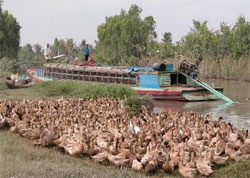Agricultural imports rise 23 per cent
 |
| illustration photo |
The increase was due to a large surge in the import prices for materials and finished products used by these sectors, the ministry said.
Fertiliser saw the highest increase in import volume and value during the period, the ministry said. Volume surged by 31.1 per cent to 2.6 million tonnes and 64 per cent in value to $1 billion.
Rubber products followed, with the country boosting imports by 40 per cent in volume to 248,000 tonnes and by 56.7 per cent in value to $613 million against the same period last year. The average import price during the eight months jumped by 41.3 per cent in comparison with the same period last year.
The ministry said pesticide imports had a year-on-year surge of 22 per cent in value to $412 million.
Import value for wood and wood products increased by 16.4 per cent to $835 million while the figure , for animal feed was $1.6 billion, equipvalent to 5.8 per cent increase.
Le Ba Lich, chairman of the Vietnam Animal Feed Association, said the animal feed industry must import a huge volume of material every year for processing at an average value of $3 billion.
Therefore, the price of animal feed was always higher here than in other countries, making it difficult for Vietnam's livestock industry to compete with similar products made in other countries, Lich said.
Pham Tat Thang, an economic expert at the Ministry of Industry and Trade's Institute for Trade Studies, said material and product imports for the farming sector would continue in the near future because most key products in the farming sector, such as fertiliser, had to be imported.
Initially, the farming, forestry and seafood sectors should apply modern measures and technologies to produce high value-added export products to reduce the trade deficit, Thang said.
But for the long term, the farming, forestry and seafood sectors should prioritise the expansion of material production for the domestic processing sector and finished products for local consumption, he said.
What the stars mean:
★ Poor ★ ★ Promising ★★★ Good ★★★★ Very good ★★★★★ Exceptional
 Tag:
Tag:
Related Contents
Latest News
More News
- Hermes joins Long Thanh cargo terminal development (February 04, 2026 | 15:59)
- SCG enhances production and distribution in Vietnam (February 04, 2026 | 08:00)
- UNIVACCO strengthens Asia expansion with Vietnam facility (February 03, 2026 | 08:00)
- Cai Mep Ha Port project wins approval with $1.95bn investment (February 02, 2026 | 16:17)
- Repositioning Vietnam in Asia’s manufacturing race (February 02, 2026 | 16:00)
- Manufacturing growth remains solid in early 2026 (February 02, 2026 | 15:28)
- Navigating venture capital trends across the continent (February 02, 2026 | 14:00)
- Motivations to achieve high growth (February 02, 2026 | 11:00)
- Capacity and regulations among British areas of expertise in IFCs (February 02, 2026 | 09:09)
- Transition underway in German investment across Vietnam (February 02, 2026 | 08:00)






















 Mobile Version
Mobile Version